Related Research Articles

David Paul Cronenberg is a Canadian film director, screenwriter, producer and actor. He is a principal originator of the body horror genre, with his films exploring visceral bodily transformation, infectious diseases, and the intertwining of the psychological, physical, and technological. Cronenberg is best known for exploring these themes through sci-fi horror films such as Shivers (1975), Scanners (1981), Videodrome (1983) and The Fly (1986), though he has also directed dramas, psychological thrillers and gangster films.
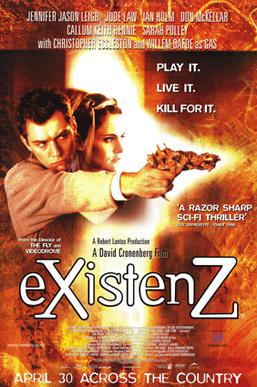
Existenz is a 1999 science fiction horror film written, produced and directed by David Cronenberg. The film follows Allegra Geller, a game designer who finds herself targeted by assassins while playing a virtual reality game of her own creation. An international co-production between Canada, the United Kingdom, and France, it also stars Jude Law, Ian Holm, Don McKellar, Callum Keith Rennie, Sarah Polley, Christopher Eccleston, Willem Dafoe, and Robert A. Silverman.

Naked Lunch is a 1991 surrealist science fiction drama film written and directed by David Cronenberg and starring Peter Weller, Judy Davis, Ian Holm, and Roy Scheider. It is an adaptation of William S. Burroughs's 1959 novel Naked Lunch, and an international co-production of Canada, Britain, and Japan.
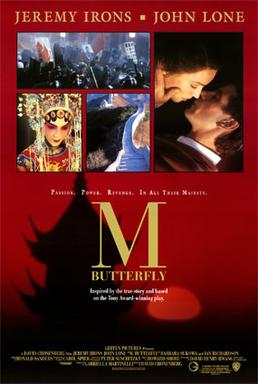
M. Butterfly is a 1993 American romantic drama film directed by David Cronenberg and written by David Henry Hwang based on his 1988 play. The film stars Jeremy Irons and John Lone, with Ian Richardson, Barbara Sukowa, and Annabel Leventon. The story is loosely based on true events which involved French diplomat Bernard Boursicot and Chinese opera singer Shi Pei Pu.
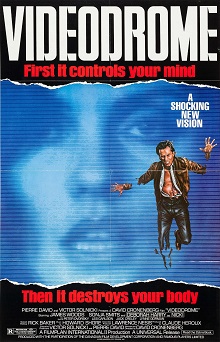
Videodrome is a 1983 Canadian science fiction body horror film written and directed by David Cronenberg and starring James Woods, Sonja Smits, and Debbie Harry. Set in Toronto during the early 1980s, it follows the CEO of a small UHF television station who stumbles upon a broadcast signal of snuff films. Layers of deception and mind-control conspiracy unfold as he attempts to uncover the signal's source, complicated by increasingly intense hallucinations that cause him to lose his grasp on reality.
Sonja Smits is a Canadian actress. She was nominated for two Genie Awards: for Videodrome (1983) and That's My Baby! (1984). On television, she starred in Street Legal (1987-1992) and Traders (1996-2000).
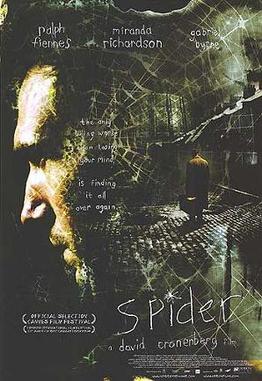
Spider is a 2002 psychological thriller film produced and directed by David Cronenberg and based on the 1990 novel of the same name by Patrick McGrath, who also wrote the screenplay.
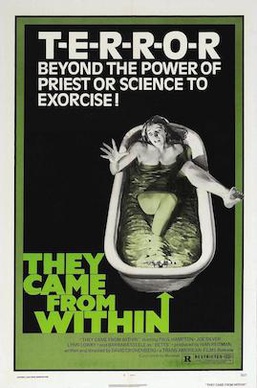
Shivers, also known as The Parasite Murders and They Came from Within, and, for Canadian distribution in French, Frissons, is a 1975 Canadian science fiction body horror film written and directed by David Cronenberg and starring Paul Hampton, Lynn Lowry, and Barbara Steele.

The Heart of the World is a Canadian short film written and directed by Guy Maddin, produced for the 2000 Toronto International Film Festival. Maddin was one of a number of directors commissioned to make four-minute short films that would screen prior to the various feature films at the 2000 festival as part of the special Preludes program. After hearing rumours that other directors were planning films with a small number of shots, Maddin decided that his film would instead contain over 100 shots per minute, and enough plot for a feature-length film. Maddin then wrote and shot The Heart of the World in the style of Russian constructivism, taking the commission at its literal face value, as a call to produce a propaganda film. Even in its expanded, 6-minute version, The Heart of the World runs at a breakneck speed, averaging roughly two shots per second, a pace intensified by the background music, Time, Forward! by Georgy Sviridov.

Don McKellar is a Canadian actor, writer, playwright, and filmmaker. He was part of a loosely-affiliated group of filmmakers to emerge from Toronto known as the Toronto New Wave.
From the Drain is a 1967 Canadian short film directed by David Cronenberg.

Crash is a 1996 Canadian erotic thriller film written, produced and directed by David Cronenberg, based on J. G. Ballard's 1973 novel of the same name. Starring James Spader, Deborah Kara Unger, Elias Koteas, Holly Hunter and Rosanna Arquette, it follows a film producer who, after surviving a car crash, becomes involved with a group of symphorophiliacs who are aroused by car crashes and tries to rekindle his sexual relationship with his wife.
Transfer is a 1966 short film written, shot, produced, edited and directed by David Cronenberg. It features Mort Ritts and Rafe Macpherson and has a runtime of 7 minutes.
Mark Irwin is a Canadian cinematographer.
Les Carlson was an American-Canadian film and television character actor who acted on stage in Canada, the U.S. and England. His films include the horror films Deranged, Black Christmas, and Videodrome, as well as the family film A Christmas Story. His television credits include The Twilight Zone and The X-Files. He was sometimes billed as "Les Carlson" and sometimes as "Leslie Carlson".

The Cinema of David Cronenberg: From Baron of Blood to Cultural Hero is a 2008 book by Ernest Mathijs about the films of director David Cronenberg. This book focuses on director David Cronenberg’s filmography, analyzing the alternative methods Cronenberg used to create and execute his films. This book focuses on the contemporary reception of Cronenberg’s works and dives into the personal experiences that have shaped Cronenberg’s film ideologies. It discusses Cronenberg’s films at length, diving into specific films to discuss technique, content, and impact. Mathijs had previously done his Ph.D. thesis on the reception of Cronenberg's films, and this book was based on that research. Mathijs had previously done his PhD thesis on the reception of Cronenberg's films, and this book was based on that research.
The World Is Watching is a Canadian short documentary film, directed by Peter Raymont and released in 1988. The film examines media coverage of the Nicaraguan Revolution through the lens of an ABC News crew on the ground in the country, documenting the various production pressures and limitations that can hamper the efforts of journalists to fully and accurately report a story; its thesis hinges in part on the fact that Nicaraguan president Daniel Ortega's key announcement that he would negotiate with the Contras was made only after the network's news production deadline for the day, leaving the network's initial reports on ABC World News Tonight able to report that he had made a speech but almost completely unable to say anything informative about it.
Preludes is a Canadian short film series, which premiered in 2000. Commissioned by the Toronto International Film Festival to mark the event's 25th anniversary in 2000, the series consisted of ten short films by Canadian directors which were inspired in some way by the festival, and each film screened as a prelude to a feature film in the 2000 Toronto International Film Festival program.

David Cronenberg is a Canadian film director, screenwriter, and actor. He is known as a principal originator of the genre commonly known as body horror, with his films exploring visceral bodily transformation, infectious diseases, and the intertwining of the psychological, physical, and technological. Cronenberg is best known for exploring these themes through sci-fi horror films such as Shivers (1975), Scanners (1981), Videodrome (1983) and The Fly (1986), though he has also directed dramas, psychological thrillers and gangster films.

Stereo is a 1969 Canadian science fiction film directed, written, produced, shot and edited by David Cronenberg in his feature film debut. Starring Ronald Mlodzik, who would go on to appear in later Cronenberg films Crimes of the Future, Shivers, and Rabid, the film was Cronenberg's first feature-length effort, following his two short films, Transfer (1966) and From the Drain (1967). The plot follows several young volunteers who participate in a parapsychological experiment.
References
- ↑ Marc Glassman, "Preludes". Take One , Vol. 30 (Winter 2001). pp. 43-44.
- ↑ Michael Posner, "Atanarjuat, War Bride lead Genie list". The Globe and Mail , December 13, 2001.
- 1 2 Mathijs 2008, p. 202.